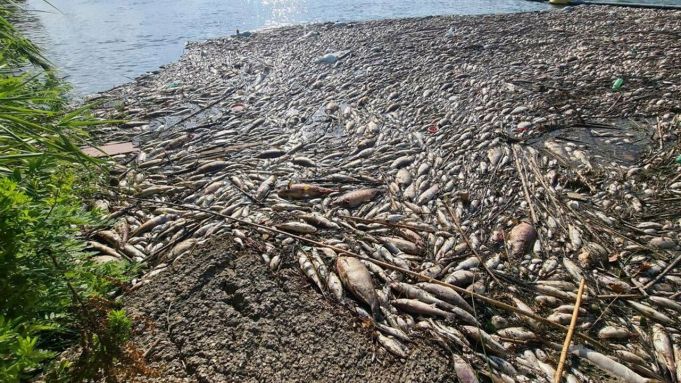Why is Rome's river Tiber full of dead fish?
Dead fish left to rot in Rome but whose job is it to remove them?
Thousands of dead fish lie floating among the weeds and rubbish in various stretches of Rome's river Tiber, including along the banks of the Lungotevere in the city centre.
The fish have been rotting in the water for several days now, with riverside bars and restaurants near Castel S. Angelo complaining that they have been left with empty tables due to the "unbearable" stench.
There were also thousands of dead fish washed up near the coastal town of Fiumicino, near Rome, where six tons worth of carcasses were removed from the river's plastic-catching barrier in recent days.
While there is nothing new about mass deaths of fish in the Tiber - it happened in May and June last year - the cause of the phenomenon remains unclear.
When the latest incident occurred last week, it was initially blamed on a spill of toxic waste, with others suggesting that pesticides used in farms north of Rome were washed off the land by a heavy rainstorm.
However the polizia fluviale, or river police, are now working on the more likely theory that pollutants from exhaust fumes, built up on the streets of the capital over the lengthy dry spell over the summer, were washed into the river by the recent rains.

This view is shared by Bruno Cignini, an expert in urban fauna and professor at Tor Vergata University, who described the accumulated pollution on the streets of the capital as "a chemical bomb".
Scientific analysis on the dead fish - mainly carp, mullet and catfish - is still ongoing as Rome grapples with another mystery: which public body is responsible for removing the dead fish from the Tiber?
Italian newspaper Il Post reports that AMA, Rome's municipal company responsible for waste disposal, has argued that its service contract does not stretch to dead fish removal; the city says it is the responsibility of the local health authorities ASL, and therefore the Lazio region; while the ASL Roma 1 branch says the mayor is the highest health authority in Rome, so the removal of the fish is the city's job.


















